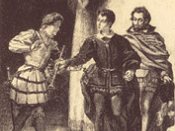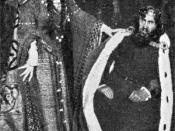The downfall of any man can be seen prior to his actual demise. In the play by Shakespeare, Hamlet, the protagonist, a young Danish prince, starts on a course that will inevitably destroy him, his family, friends, and love. What begins this is the death of his father, but it is his overall attitude that makes this incident lead to his downfall. Hamlet grieves too much over his father. He procrastinates his revenge. He feels betrayed by everyone. Finally, his overall outlook on life is very dark and he contemplates death more than once. It is these attitudes that make his destined for destruction.
Hamlet's first destructive attitude is grief. His father had been dead for two months and he still wore black clothes in mourning. He has yet to learn of his uncle's crime of murdering his father and he already rejects him despite his seemingly sincere gestures.
Hamlet sees Claudius only in relation to his own father, "Hyperion to a satyr,"ÃÂ he commented once. He elevates his own father so much that he can see nothing but him. Under his perception, not just the king's brother, but anyone and everyone is unfit to take his father's place. With that attitude he can not see anyone, even himself, as anything more than dust in his father's shadow. Claudius coined it best, ""ÃÂtis unmanly grief."ÃÂ When Hamlet finally learns the truth of his great father's death, he procrastinates his revenge many times. At first he doubts the truth of these words. He plans and schemes in order to be certain. When he is finally certain, he waits for the perfect moment. That moment finally comes after his mother is poisoned and he has but a few minutes to live. Many times, he vows to be bent on revenge, only to hold off till later. Even his father says he has an "almost blunted purpose."ÃÂ Had he only made his revenge sooner, he may not have had to with his last breath.
What lead, not so much to Hamlet's but to everyone else's downfall, was Hamlet's over exaggerated sense of betrayal. Hamlet feels betrayed by those closest to him, but who really did betray him? His mother was only concerned about her son's well-being. Ophelia was only complying with her father's wishes. Rosencrantz and Guildenstern were only being faithful to their king. No one, with the possible exception of Claudius, ever stabbed him in the back. He accused his friends of playing him like a "pipe"ÃÂ. He demands that Ophelia go to a nunnery and breaks her heart. He confronts his mother with harsh words. It was the feeling of betrayal by his mother that causes him to lash out at the unsuspecting Polonius. It was his rage that caused Ophelia's madness and it was his disrespect of these "traitors"ÃÂ that caused him to guiltlessly send Rosencrantz and Guildenstern to their death. His feelings of betrayal made him destroy those innocent people around him.
Most clear and most influential in his downfall is his overall out look on life. In the first speech by Hamlet he is already contemplating suicide after his father's death. If "the Everlasting had not fix'd his canon "ÃÂgainst self-slaughter."ÃÂ this would have been a very short play. Later on he despises his life and wish he was never born, "That ever I was born to set it right."ÃÂ He again contemplates death with, "To be, or not to be."ÃÂ He reluctantly decides to be. He sees Denmark as a prison and as "one o'th' worst."ÃÂ He also thinks little of man's existence. He sees man as nothing more than dust. In the graveyard scene he sees that all men, regardless of greatness in life, all wind up as an empty, forgotten skull. Hamlet was a prince and thus entitled to a very luxurious life, however he still has a horribly pessimistic view of life. Hamlet clearly shows a disinterest in being alive. His downfall is almost cliche of "be careful what you wish for."ÃÂ He longs to die, and he does in the end. He was destroyed because he wanted to be destroyed.
Hamlet was never destined to be destroyed. It was how he decided to feel about life. His father's death was just the nudge to send him falling down. He brought destruction on himself.
His grief prevented him from moving on. His procrastination ended any chance of an easy resolve.
His feeling of betrayal made him lash out at those closest to him. Lastly, his pessimism made him accept and even welcome his downfall. Thus destructive attitudes lead to destruction.





